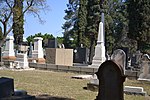The Human Sciences Research Council (HSRC) of South Africa is Africa's largest dedicated social science and humanities research agency and policy think tank. It primarily conducts large-scale, policy-relevant, social-scientific projects for public-sector users, for non governmental organisations and international development agencies in support of development nationally, in the Southern African Development Community (SADC) and in Africa.
The HSRC also seeks to contribute to the research and development strategy of the HSRC's parent Department of Science and Technology, especially through its mission to focus on the contribution of science and technology to addressing poverty.
The HSRC originates in the National Bureau of Education and Social Research (founded in 1929). In recent years the HSRC has undergone major restructuring, aligning its research activities and structures to South Africa's national development priorities: notably poverty reduction through economic development, skills enhancement, job creation, the elimination of discrimination and inequalities, and effective service delivery. In essence, the HSRC is looking at the following broad dimensions of Poverty, Inequality and Inclusive Development under the following banners, which are:
Economic Inclusion: including growth, competitiveness, regional integration, infrastructure, technological innovation ICT, resources (natural, human, land), labour markets and spatial dynamics (urbanisation, agglomeration, density);
Social Development: including well-being (quality of life, security, social and spatial mobility, migration), human capabilities (education, skills, health, etc.), social relationships (race, class, gender, identity, etc.), social institutions and cohesion (family, community, etc.);
Governance and Decision-making: including political participation, democracy, trust-building, nurturing legitimacy in public structures, capacity-building in the state, enhancing leadership, distributing power, accountability, responsiveness, social movements, multi-level government and coordinated decision-making.







